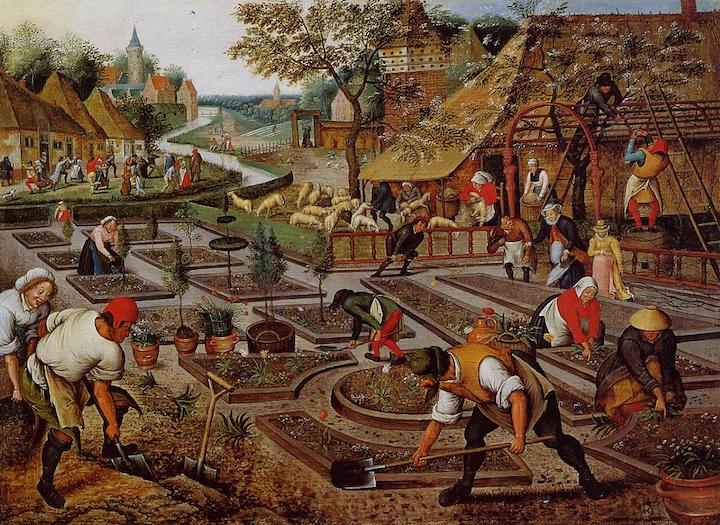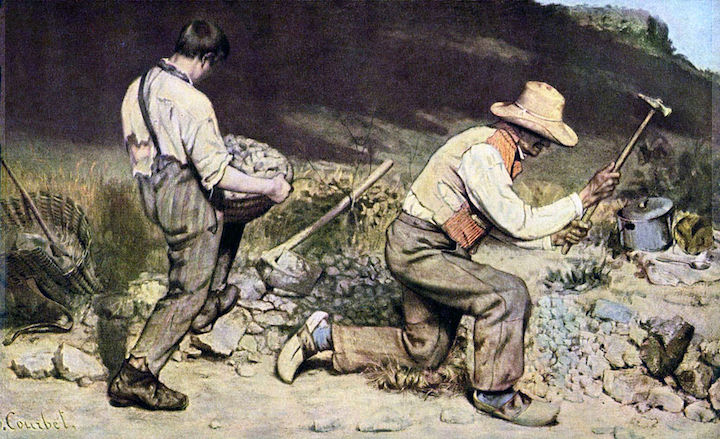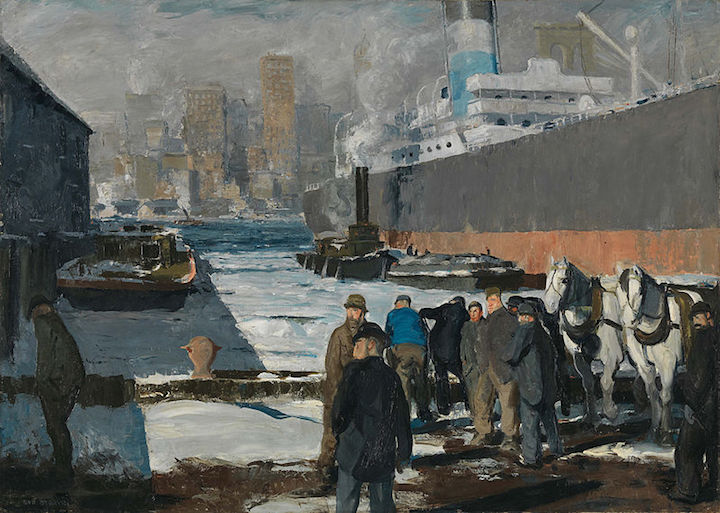Pope St. John Paul II
The Church is convinced that work is a fundamental dimension of man’s existence on earth. She is confirmed in this conviction by considering the whole heritage of the many sciences devoted to man: anthropology, palaeontology, history, sociology, psychology and so on; they all seem to bear witness to this reality in an irrefutable way. But the source of the Church’s conviction is above all the revealed word of God, and therefore what is a conviction of the intellect is also a conviction of faith. The reason is that the Church-and it is worthwhile stating it at this point-believes in man: she thinks of man and addresses herself to him not only in the light of historical experience, not only with the aid of the many methods of scientific knowledge, but in the first place in the light of the revealed word of the living God. Relating herself to man, she seeks to express the eternal designs and transcendent destiny which the living God, the Creator and Redeemer, has linked with him.
The Church finds in the very first pages of the Book of Genesis the source of her conviction that work is a fundamental dimension of human existence on earth. An analysis of these texts makes us aware that they express-sometimes in an archaic way of manifesting thought-the fundamental truths about man, in the context of the mystery of creation itself. These truths are decisive for man from the very beginning, and at the same time they trace out the main lines of his earthly existence, both in the state of original justice and also after the breaking, caused by sin, of the Creator’s original covenant with creation in man. When man, who had been created “in the image of God. . . .male and female,” hears the words: “Be fruitful and multiply, and fill the earth and subdue it,” even though these words do not refer directly and explicitly to work, beyond any doubt they indirectly indicate it as an activity for man to carry out in the world. Indeed, they show its very deepest essence. Man is the image of God partly through the mandate received from his Creator to subdue, to dominate, the earth. In carrying out this mandate, man, every human being, reflects the very action of the Creator of the universe.
Work understood as a “transitive” activity, that is to say an activity beginning in the human subject and directed towards an external object, presupposes a specific dominion by man over “the earth,” and in its turn it confirms and develops this dominion. It is clear that the term “the earth” of which the biblical text speaks is to be understood in the first place as that fragment of the visible universe that man inhabits. By extension, however, it can be understood as the whole of the visible world insofar as it comes within the range of man’s influence and of his striving to satisfy his needs. The expression “subdue the earth” has an immense range. It means all the resources that the earth (and indirectly the visible world) contains and which, through the conscious activity of man, can be discovered and used for his ends. And so these words, placed at the beginning of the Bible, never cease to be relevant. They embrace equally the past ages of civilization and economy, as also the whole of modern reality and future phases of development, which are perhaps already to some extent beginning to take shape, though for the most part they are still almost unknown to man and hidden from him. – from Laborem Exercens (1981)

Pope Benedict XVI
The challenge of development today is closely linked to technological progress, with its astounding applications in the field of biology. Technology – it is worth emphasizing – is a profoundly human reality, linked to the autonomy and freedom of man. In technology we express and confirm the hegemony of the spirit over matter. “The human spirit, ‘increasingly free of its bondage to creatures, can be more easily drawn to the worship and contemplation of the Creator.’” Technology enables us to exercise dominion over matter, to reduce risks, to save labour, to improve our conditions of life. It touches the heart of the vocation of human labour: in technology, seen as the product of his genius, man recognizes himself and forges his own humanity. Technology is the objective side of human action whose origin and raison d’etre is found in the subjective element: the worker himself. For this reason, technology is never merely technology. It reveals man and his aspirations towards development, it expresses the inner tension that impels him gradually to overcome material limitations. Technology, in this sense, is a response to God’s command to till and to keep the land (cf. Gen 2:15) that he has entrusted to humanity, and it must serve to reinforce the covenant between human beings and the environment, a covenant that should mirror God’s creative love.
Technological development can give rise to the idea that technology is self-sufficient when too much attention is given to the “how” questions, and not enough to the many “why” questions underlying human activity. For this reason technology can appear ambivalent. Produced through human creativity as a tool of personal freedom, technology can be understood as a manifestation of absolute freedom, the freedom that seeks to prescind from the limits inherent in things. The process of globalization could replace ideologies with technology, allowing the latter to become an ideological power that threatens to confine us within ana priori that holds us back from encountering being and truth. Were that to happen, we would all know, evaluate and make decisions about our life situations from within a technocratic cultural perspective to which we would belong structurally, without ever being able to discover a meaning that is not of our own making. The “technical” worldview that follows from this vision is now so dominant that truth has come to be seen as coinciding with the possible. But when the sole criterion of truth is efficiency and utility, development is automatically denied. True development does not consist primarily in “doing.” The key to development is a mind capable of thinking in technological terms and grasping the fully human meaning of human activities, within the context of the holistic meaning of the individual’s being. Even when we work through satellites or through remote electronic impulses, our actions always remain human, an expression of our responsible freedom. Technology is highly attractive because it draws us out of our physical limitations and broadens our horizon. But human freedom is authentic only when it responds to the fascination of technology with decisions that are the fruit of moral responsibility. Hence the pressing need for formation in an ethically responsible use of technology. Moving beyond the fascination that technology exerts, we must reappropriate the true meaning of freedom, which is not an intoxication with total autonomy, but a response to the call of being, beginning with our own personal being. – from Caritas in veritate (2009)

Pope Francis
Person and work are two words that can and must stand together. Because if we think and talk about ‘work’ without the ‘person’, work ends up becoming something inhuman which, in forgetting people, also forgets and loses itself. But if we think of a person without work, we are talking about something partial, incomplete, because a person is fully realized when he or she becomes a worker; because the individual becomes a person when he or she opens up to others, to social life, when he or she flourishes in work. A person flourishes in work. Work is the most common form of cooperation that humanity has generated in its history. Every day, millions of people cooperate simply by working: educating our children, operating mechanical devices, sorting out paperwork in an office. . . .Work is a form of civil love: it is not romantic love nor always an intentional love, but it is a true, authentic love that enables us to live and moves the world forward.
Certainly, a person is not only about work. . . .We must also consider the healthy culture of idleness, of knowing how to rest. This is not laziness; it is a human need. When I ask a man, a woman who has two, three children: “Tell me, do you play with your children? Do you have this ‘idleness’?” — “Well, you know, when I go to work, they are still asleep, and when I get back, they’re already in bed”. This is inhuman. That is why, along with work, the other culture must also be present. Because a person is not just about work, because we do not always work, and we do not always have to work. As children we do not work, and should not have to work. We do not work when we are sick nor when we are elderly. There are many people who are not yet working or who no longer work. All this is true and well known, but it must be remembered today too, when there are still too many children and young people who work and do not study, whereas study is the only good “work” for children and for the young. And when the right to a fair pension is not recognized always and for everyone — “fair” as in neither too meager nor too lavish: “golden pensions” are no less an offence to labour than pensions that are too meager, as they ensure that inequalities during the working life become permanent. Or when a worker becomes ill and is also rejected from employment in the name of efficiency. Instead, if a sick person can manage to continue to work within his or her limitations, work can also have a therapeutic function: sometimes one recovers by working with others, together with others, for others.
A society that compels the elderly to work too long and forces an entire generation of young people not to work when they should do so for themselves and for all, is foolish and shortsighted. When the young are outside the work force, businesses lack energy, enthusiasm, innovation, and ‘joie de vivre’, which are valuable common assets that improve economic life and public happiness. It is therefore urgent to form a new human social pact, a new social pact for labour, that reduces working hours for those who are in the last phase of their working life, to create jobs for the young who have the right and duty to work. The gift of work is the first gift fathers and mothers give to their sons and daughters; it is a society’s prime patrimony. It is the first endowment with which we help them to take off on their first free flight of adult life. – from his June 28, 2017 Address to Italian labor unions
















